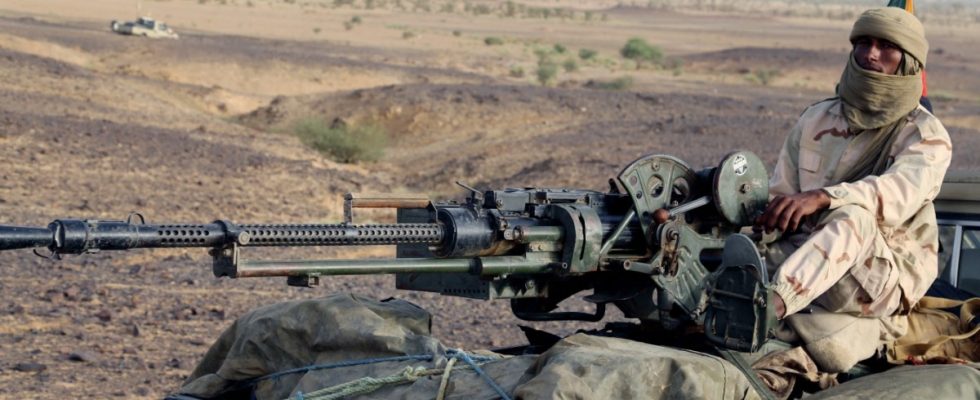The Tuareg call it self-defense. Their leaders in northern Mali are calling for all forces to be mobilized “with the aim of protecting the homeland.” Another war is brewing in western Africa, which the Tuareg do not want declared. But apparently they consider it inevitable. At least that’s what the statement sent by the Coordination des Mouvements de l’Azawad (CMA) reads a few days ago. The alliance brings together several groups of the Tuareg, a nomadic Berber people striving for self-determination. Some of these forces are staunch separatists; Tuareg uprisings have a long history. Azawad is their name for the areas that they historically claim on the edge of the Sahara, large parts of the territories are in Mali.
The Tuareg have already clearly identified two opponents: the Malian army, i.e. the troops under the command of the junta that seized power in Bamako; and their new protectors in the form of Russian Wagner mercenaries, of which around 1,000 to 2,000 are said to be in Mali. The Tuareg call the Russian forces “terrorists” from whom their civilians should stay away if possible. However, this only outlines one of the numerous fronts that determine the combat situation in Mali.
Hundreds of Bundeswehr members are still in West Africa
One thing is certain: there will be fierce fighting again in shattered Mali, which also affects German interests. In the short term, it is particularly important to ensure the safe withdrawal of the remaining Bundeswehr soldiers who were stationed in Mali as part of the UN Mission Minusma. Since coup plotters have come to power in neighboring Niger, the situation has become particularly complicated. A spokesman for the Bundeswehr’s operational command in Potsdam puts it this way: “The actions of various actors in Mali cause a permanent, latent threat in the entire operational area.” Since the coup in Niger on July 26th, the airspace there has been closed. “The relocation of personnel and material by air from Gao to Niamey is currently not taking place,” explains the operational command, but alternatives to the Niamey air transport base are being used. According to the Bundeswehr, around 785 German soldiers are still in Mali and 90 are stationed in Niger.
The chairwoman of the Defense Committee in the German Bundestag, Marie-Agnes Strack-Zimmermann (FDP), does not consider any further acceleration of the withdrawal necessary despite the renewed violence in Mali. The Bundeswehr is working bit by bit on the complete withdrawal by the end of December, she says South German newspaper. “There are of course plans in place to accelerate the withdrawal in the event of an emergency. As of today, however, this is not necessary.”
With the operations in Mali and Niger, the federal government originally wanted to help stabilize the Sahel region, also to curb flights to Europe and especially to Germany. Despite the new fighting, the Bundeswehr says there are currently no major problems with the withdrawal: “So far, the relocation of personnel and material is going according to plan.”
However, there is talk in Bundestag circles that more material may have to be left behind than planned and, if necessary, destroyed so that it does not fall into the hands of the military or rebels in Mali. At the time of the last extension of the mandate by the Bundestag at the end of May 2023, material with a volume of 1,500 containers was still in Mali; according to the operational command, around two thirds should return to Germany. “Thanks to the extensive planning of the relocation by air and land, the ongoing analysis of the security situation and flexible adjustments to developments in the region, we are on schedule to complete these measures by the end of the year, both in terms of personnel and material,” says a speaker.
The jihadists are getting stronger
Separatists, bandits, mercenaries, jihadists – and an army that also shoots civilians: the number of armed groups in Mali is large. It is sometimes difficult to keep track of who is making deals with whom. Violence by Islamist groups has been increasing for some time, as the Africa Center for Strategic Studies, funded by the US Congress, has observed. The jihadists are apparently expanding their influence again.
The large country has been heavily fragmented for years. The fighting that is now flaring up in the north represents an escalation that also affects important European interests beyond the withdrawal of troops. The conflicts in the Sahel pose numerous security risks, especially for nearby Europe: the threat of Islamist terrorism, smuggling and smuggling networks, and difficult-to-control migration flows.
But the French anti-terror units that fought against Islamist extremists for almost a decade have withdrawn, and anti-French sentiment in Mali accelerated the withdrawal. In June, the UN Security Council in New York also ended the mandate of the UN force Minusma and has since taken the approximately 13,000 blue helmet soldiers out of the crisis state of Mali because the ruling junta in Bamako no longer wants them all in the country .
This has consequences: the withdrawal of foreign troops gradually opens up spaces into which other actors are now moving. Who will occupy the vacant bases? The Tuareg are competing with units of the Malian army and Wagner mercenaries; they are currently fighting each other.
And so the Algiers Agreement from 2015, which was supposed to bring peace to the region, collapsed. The Malian state was supposed to be strengthened at the time and at the same time the Tuareg were given the opportunity to govern themselves. The agreements were aimed at greater development and broad reconciliation between the rival groups. But the fragile north of Mali has never found a lasting balance. Now the signs point to war.

